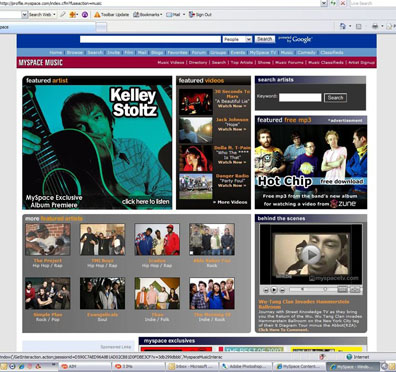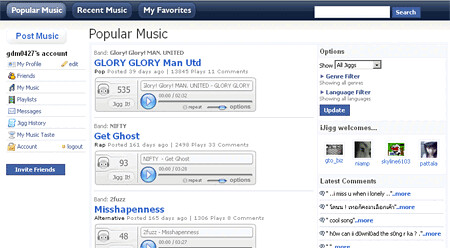 Good enough for Reznor's Ghosts
Good enough for Reznor's Ghosts Industrial goth rocker Trent Reznor isn't usually mentioned in the same sentence with artists like Over the Rhine and Steven Delopoulos, but all three have something in common: in the last year, the bands ditched record labels altogether. Instead, they're part of a bold new experiment that could let artists hang onto more rights, make more money, and go directly to fans. It's possible through a startup called TuneCore that let all three bands get their music into digital stores like eMusic and iTunes... for just $30 a year. All royalties—and all rights—remain with the artists.
Jeff Price, who heads TuneCore, says that "the music industry changed" when the service went live, but can a small Brooklyn outfit running on rented virtual servers really remake the music biz? Let's take a look... and then upload an original Ars composition to see how well the system works.
Distribution blues
Back in the day, it just didn't matter how big you were; as a musician, you weren't going to distribute your own record. It simply wasn't possible to get the records, tapes, or discs onto retail shelves without a label making it happen, and of course no exhaustive online stores existed. Unless you were content selling your music from the trunk of your car after gigs, a label was a necessity.
Jeff Price, who heads TuneCore, notes that the record labels' primary role became distribution (though they also do marketing). When the digital revolution arrived, though, it "disintermediated" the labels; it cut out the middleman.
Suddenly, without the need for massive infrastructure and with the presence of unlimited "shelf space" for music, artists could get themselves into the new stores without needing a label, but they still needed someone to help with the mundane details that surrounded loading music into a store like iTunes, stuff like contracts, signatures, renewals, payment processing, properly-formatted music files, and album art produced to each store's specifications. In other words, artists needed an administrator but not necessarily a full-blown label.
And the digital stores want a middleman, too; none of them really want to deal with a million artists directly, artists who can't properly submit XML-formatted album data and AAC files at the right bitrate.
Enter TuneCore. The company competes with aggregators (companies like The Orchard) and with traditional record labels, but its model is quite different. While the other entities generally want to control the rights to master recordings and take a cut of the proceeds, TuneCore ditches this model in favor of flat-fee payments.
 Jeff Price
Jeff Price TuneCore charges $19.98 a year to store an uploaded album from any artist. It charges an additional $0.99 per song on that album, along with a $0.99 charge for each music store that it submits to (iTunes, eMusic, Amazon, and Rhapsody, among others); these are one-time charges. That's it.
Twenty years ago, an artist with an acoustic guitar and a four-track demo would need to find a label to get her album on the shelves at Tower Records. Getting that contract was a long and painful process for the few who could navigate it; for most, it never led to anything, and that four-track demo was heard only by friends, family, and patrons of the local coffee shop.
Today, an artist can stock her music on the digital equivalent of Tower Records for a few bucks (the real Tower Records went out of business years ago, its business model rendered increasingly obsolete by digital downloads on the one hand and cheap physical discs from stores like Amazon, Best Buy, and Target on the other).
This shift in the economics of distribution is what leads Price to tell Ars that "the music industry changed" on the day that TuneCore went live. Any person on the planet "can have access to worldwide distribution; there are no filters," he says, and he says it with energy. This is a man who relishes what he does, and he's thrilled with his chance to upset the industry apple cart.
Price summed up his excitement about the new model in a recent Huffington Post piece on the democratization of the music business, saying, "I took to the emerging digital sector the way Bush took to weapons of mass destruction." But Bush's excitement about WMDs turned up little in the Iraqi sands; Price is hoping for more success.
Continue reading @ ars technica
 Move over MySpace music. Google's YouTube is adding ecommerce in an effort to monetize the site's huge traffic beyond advertising, the company announced yesterday. Initial partners include Amazon MP3 and iTunes who will offer music and game downloads.
Move over MySpace music. Google's YouTube is adding ecommerce in an effort to monetize the site's huge traffic beyond advertising, the company announced yesterday. Initial partners include Amazon MP3 and iTunes who will offer music and game downloads.
















